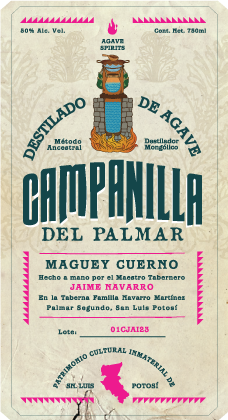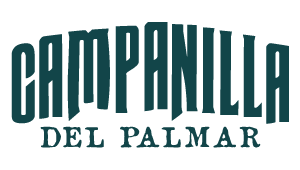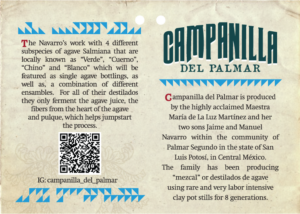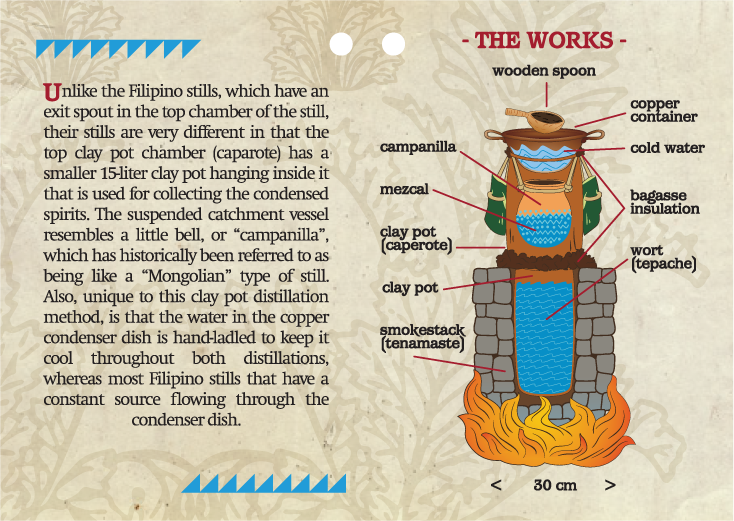LA FAMILIA


Distilled in clay-pots in Santa Catarina Minas since 1898. Real Minero, represents a family tradition of commitment and dedication to producing some of the finest handcrafted small batch mezcal in Mexico. The very strict quality control measures that are in place guarantee the amazing quality of these mezcales.


With over 70 years experience, Rey Campero represents the culture, tradition, and art of Candelaria Yegolé, a small village in the Sierra Sur, along the Rio Quiechapa, where the soil is fertile and home to more than seven species of agave growing wild along the slopes and canyons.

Caballito Cerrero
Caballlito Cerrero has a cult following amongst Tequila and Mezcal aficionados worldwide. The true diehards that visit Guadalajara search high and low to be able to take bottles of Caballito Cerrero home with them.

Chacolo
The Partida family, lead by Don Macario has been making their iconic “mezcales” for 5 generations in Zapotitlan de Vadillo, Jalisco, however due to legalities they can neither call their product mezcal nor tequila. They are renowned in amongst mezcaleros and mezcal aficionados in the know for the amazing spirits that are meticulously made from the 15 different agave varietals that they have been collecting from their region for three generations; of which 14 of them are A. angustifolia sub varietals and 1 A. rhodacantha.

Charanda
Charanda is a D.O. protected cane distillate that can only be made in 16 municipalities in Michoacán. The raw material (sugarcane, molasses or piloncillo) may only come from within the D.O. The protected D.O. for Charanda is very specific and speaks to a unique soil deep reddish soil type. that is found in these 16 municipalities that the Tarascan’s in their native language of Purepecha called Charanda meaning “tierra rojiza”. This red volcanic soil is extremely high in minerality and iron when combined with warm days and cool nights create the perfect environment for the sugarcane to grow.


Campanilla del Palmar is produced by the highly acclaimed Maestra María de La Luz Martínez and her two sons Jaime and Manuel Navarro within the community of Palmar Segundo in the state of San Luis Potosí, in Central México. The family has been producing “mezcal” or destilados de agave using rare and very labor intensive clay pot stills for 8 generations.
is produced by the highly acclaimed Maestra María de La Luz Martínez and her two sons Jaime and Manuel Navarro within the community of Palmar Segundo in the state of San Luis Potosí, in Central México. The family has been producing “mezcal” or destilados de agave using rare and very labor intensive clay pot stills for 8 generations.
The Navarro’s work with 4 different subspecies of agave Salmiana that are locally known as “Verde”, “Cuerno”, “Chino” and “Blanco” which will be featured as single agave bottlings, as well as a combination of different ensambles. For all of their destilados they only ferment the agave juice, the fibers from the heart of the agave and pulque, which helps jumpstart the process.
Unlike the Filipino stills, which have an exit spout in the top chamber of the still, their stills are very different in that the top clay pot chamber (caparote) has a smaller 15-liter clay pot hanging inside it that is used for collecting the condensed spirits. The suspended catchment vessel resembles a little bell, or “campanilla”, which has historically been referred to as being like a “Mongolian” type of still. Also, unique to this clay pot distillation method, is that the water in the copper condenser dish is hand-ladled to keep it cool throughout both distillations, whereas most Filipino stills have a constant source flowing through the condenser dish.


NEWSLETTER SIGN UP
Get updates on new products and events in your area.
